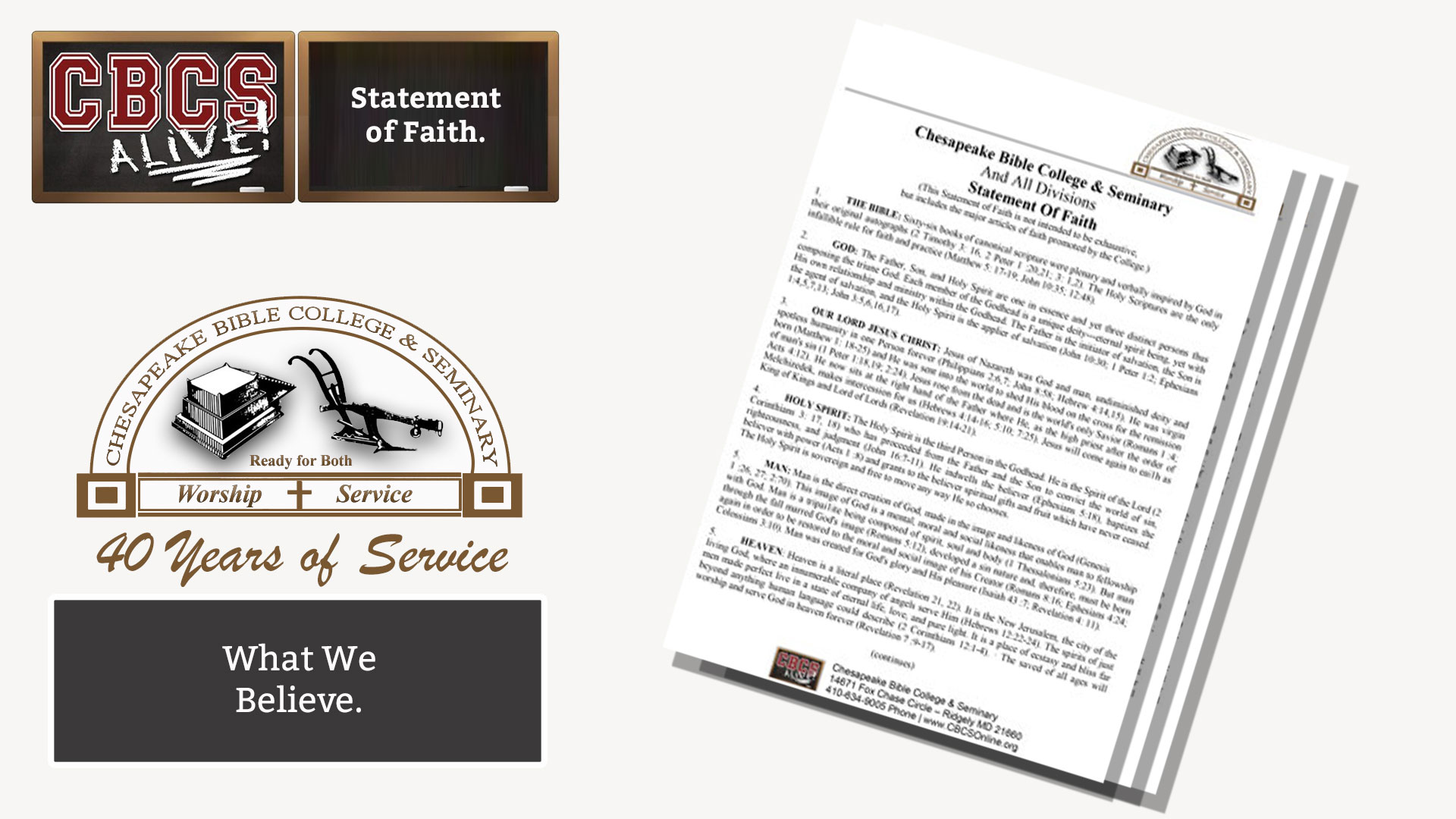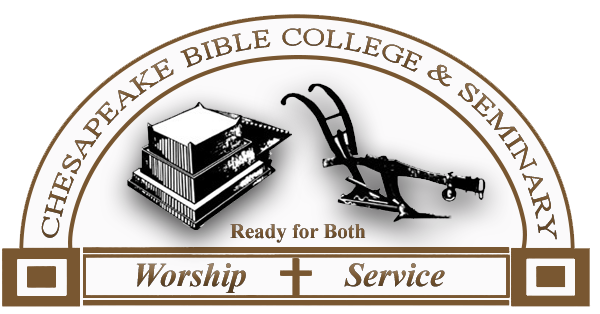
STATEMENT OF FAITH

Chesapeake Bible College & Seminary
And All Divisions
Statement Of Faith
(This Statement of Faith is not intended to be exhaustive,
but includes the major articles of faith promoted by the College.)
1. THE BIBLE: Sixty-six books of canonical scripture were plenary and verbally inspired by God in their original autographs (2 Timothy 3:16, 2 Peter 1:20,21; 2 Peter 3:1,2). The Holy Scriptures are the only infallible rule for faith and practice (Matthew 5:17-19; John 10:35; 12:48).
2. GOD: The Father, Son, and Holy Spirit are one in essence and yet three distinct persons thus composing the triune God. Each member of the Godhead is a unique deity—eternal spirit being, yet with His own relationship and ministry within the Godhead. The Father is the initiator of salvation, the Son is the agent of salvation, and the Holy Spirit is the applier of salvation (John 10:30; 1 Peter 1:2; Ephesians 1:4,5,7,13; John 3:5,6,16,17).
3. OUR LORD JESUS CHRIST: Jesus of Nazareth was God and man, undiminished deity and spotless humanity in one Person forever (Philippians 2:6,7; John 8:58; Hebrews 4:14,15). He was virgin born (Matthew 1:18-25) and He was sent into the world to shed His blood on the cross for the remission of man’s sin (1 Peter 1:18,19; 2:24). Jesus rose from the dead and is the world’s only Savior (Romans 1:4; Acts 4:12). He now sits at the right hand of the Father where He, as the high priest after the order of Melchizedek, makes intercession for us (Hebrews 4:14-16; 5:10; 7:25). Jesus will come again to earth as King of Kings and Lord of Lords (Revelation 19:14-21).
4. HOLY SPIRIT: The Holy Spirit is the third Person in the Godhead. He is the Spirit of the Lord (2 Corinthians 3:17, 18) who has proceeded from the Father and the Son to convict the world of sin, righteousness, and judgment (John 16:7-11). He indwells the believer (Ephesians 5:18), baptizes the believer with power (Acts 1:8) and grants to the believer spiritual gifts and fruit which have never ceased. The Holy Spirit is sovereign and free to move any way He so chooses.
5. MAN: Man is the direct creation of God, made in the image and likeness of God (Genesis 1:26, 27; 2:70). This image of God is a mental, moral and social likeness that enables man to fellowship with God. Man is a tripartite being composed of spirit, soul and body (1 Thessalonians 5:23). But man through the fall marred God’s image (Romans 5:12), developed a sin nature and, therefore, must be born again in order to be restored to the moral and social image of his Creator (Romans 8:16; Ephesians 4:24; Colossians 3:10). Man was created for God’s glory and His pleasure (Isaiah 43:7; Revelation 4:11 ).
6. HEAVEN: Heaven is a literal place (Revelation 21, Revelation 22). It is the New Jerusalem, the city of the living God, where an innumerable company of angels serve Him (Hebrews 12:22-24). The spirits of just men made perfect live in a state of eternal life, love, and pure light. It is a place of ecstasy and bliss far beyond anything human language could describe (2 Corinthians 12:1-4). The saved of all ages will worship and serve God in heaven forever (Revelation 7:9-17).
7. HELL: Hell is a literal place of outer darkness and everlasting punishment prepared for the devil and his angels (Matthew 25:41, 46; 13:49,50; Revelation 20:10). It is also a place of weeping, wailing, and gnashing of teeth for those who die outside of the Lord Jesus Christ (Matthew 8:12; Revelation 21:8; 22:15). The Bible describes it as a place of torment from fire and brimstone forever and ever (Revelation 14: 10, 11).
8. SALVATION: The literal meaning of this term is, “deliverance, preservation, rescue, safety, and healing.” It is, then, a deliverance from guilt and rescue from the penalty of sin, which is death. It is a deliverance from the power of indwelling sin through the gracious indwelling presence of God the Holy Spirit. Salvation is also preservation from the very presence and pollution of sin at the second coming of Jesus Christ (Hebrews 2:3; 2 Corinthians 1:6; 1 Thessalonians 5:9). To experience salvation is to be in a state of inner safety and healing. Salvation is received through faith in the death and resurrection of the Lord Jesus Christ (Matthew 1:21; Acts 16: 31; John 3:17). Salvation is ” … by grace through faith and that not of ourselves, it is the gift of God” (Ephesians 2:8,9). The Bible commands those who are saved to be baptized in water and become disciples of Jesus Christ (Matthew 28:19-20).
9. CHURCH: The church is the mystical body of Christ of which He is the Head (Ephesians 1:22,23). This mystical body is expressed both universally and locally. Every believer is a member of the Universal Church that is the whole family of God in Heaven and on earth (Ephesians 3:14, 15). The local church, however, is an organism that God has established in specific locations to carry on His work in the earth. It has officers such as elders and deacons (1 Timothy 3); it administers ordinances such as water baptism and the Lord’s Supper (Acts 2:38; 1 Corinthians 11: 17-34); and it also has orders, such as to “make disciples of all nations” (Matthew 28:19). Believers are commanded to be servants to each other and to those who rule over us in the Lord (1 Corinthians 16:15,16;Hebrews 13:17; 1 John 3:16).
10. THE PURPOSE OF THE CHURCH: The first purpose of the Church is to corporately worship God (Hebrews 13:15; Ephesians 5:19; Colossians 3:16). This worship is to be followed through by evangelism. The command to make disciples has never been rescinded (Matthew 28:19,20). God’s plan for the world is that the Church will carry out its mission by preaching the Gospel to the lost in order to bring them to salvation (Acts 1:8; 8:4). Another purpose of the Church is the building up of its members. This is done by developing their gifts (Romans 12:5-8; 1 Peter 4:9-11). Five gift-ministries have been set in the Church to equip the member-saints to do the work of the ministry (Ephesians 4:16). In this way each member realizes his call as a believer-priest whose function is to worship God and lead others to Him (1 Peter 2:5, 9).
